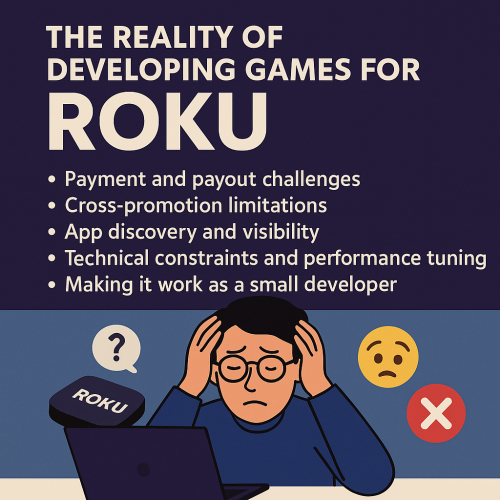
Roku offers a widely adopted platform for delivering streaming content, and it also supports interactive applications—including games. While developing for Roku can be an interesting and rewarding experience, it comes with some unique technical and operational challenges, especially for independent developers.
This post reflects personal experiences, insights, and some of the practical lessons learned while building and supporting multiple games on Roku.
For developers in certain regions, receiving payouts from the Roku platform can be difficult or even unavailable. Additionally, working with international clients can lead to delays caused by banking regulations, payment service limits, or documentation requirements.
In one case, a client’s PayPal account was temporarily limited simply while trying to complete a legitimate payment. These situations are rarely the fault of any single party—they’re often due to standard security checks or platform policies.
If you're new to selling games or freelance work internationally, it’s worth being prepared with alternative options such as direct bank transfers, Wise, or setting up a business account where possible.
Previously, Roku supported an API called ShowChannelStoreSpringboard(), which allowed developers to direct users to other apps, including their own. This was helpful for promoting a portfolio of games from within your apps.
As of early 2025, Roku has officially deprecated this functionality. While apps that used it previously may still work, updated submissions will not pass certification if they rely on it. This change affects many developers, particularly those relying on organic promotion within their ecosystem.
Some larger studios bundle multiple games into a single channel to work around this, but this may not be practical for individual developers.
Unlike many mobile app stores, Roku's system for highlighting or categorizing new apps is less transparent. Newly released games are not automatically listed in the Games category, and developers don’t have direct control over placement.
Roku does offer advertising campaigns, but these tend to be oriented toward video and streaming apps and are often not cost-effective for smaller indie games.
Efforts to promote Roku apps on external platforms can also be tricky. For example, posting on some forums or subreddits may be restricted for promotional content—even when it's meant to be informative.
When working with Roku's pure brightscript api or SceneGraph framework, you may encounter frame rate inconsistencies depending on the device. Some models perform well, while others can vary widely in FPS.
To address this, we implemented a user-facing setting that allows players to select their preferred FPS cap (e.g., 25 / 30 / 40 / 50 / Unlimited). While this doesn’t solve every performance issue, it gives end users some control and improves the experience across different Roku devices.
We also discovered that adjusting timing calculations—using milliseconds instead of converting to seconds—helped improve movement smoothness in games. These sorts of low-level adjustments can make a noticeable difference.
Despite the hurdles, developing for Roku can still be rewarding—especially when leveraging strategies like:
In the past, we saw good results by promoting one app within another using subtle UI elements (such as a “More Games” sidebar). While this may no longer be allowed in new submissions, similar functionality might be possible in other formats like embedded videos or QR-code-based suggestions.
Roku remains a viable platform for simple, accessible games—but it’s important to understand the limitations and plan accordingly. Monetization, visibility, and platform restrictions may require extra creativity, technical workarounds, and patience.
For anyone considering Roku development, the best advice is: start small, test often, and stay up-to-date with platform changes.
If you’d like to share ideas, exchange tips, or ask questions about Roku development, feel free to reach out via email—I’m always happy to chat.